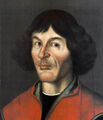Template:Selected anniversaries/May 24: Difference between revisions
No edit summary |
No edit summary |
||
| Line 1: | Line 1: | ||
<gallery> | <gallery> | ||
|| *** DONE: Pics *** | |||
File:Lanfranc circa 1100.jpg|link=Lanfranc (nonfiction)|1089: Celebrated jurist and monk [[Lanfranc (nonfiction)|Lanfranc]] dies. | File:Lanfranc circa 1100.jpg|link=Lanfranc (nonfiction)|1089: Celebrated jurist and monk [[Lanfranc (nonfiction)|Lanfranc]] dies. | ||
| Line 33: | Line 35: | ||
||1962: Project Mercury: American astronaut Scott Carpenter orbits the Earth three times in the Aurora 7 space capsule. | ||1962: Project Mercury: American astronaut Scott Carpenter orbits the Earth three times in the Aurora 7 space capsule. | ||
||1965: Lucien Lévy dies ... radio engineer and radio receiver manufacturer. He invented the superheterodyne method of amplifying radio signals, used in almost all AM radio receivers. His patent claim was at first disallowed in the United States in favour of the American Edwin Howard Armstrong, but on appeal Lévy's claim as inventor was accepted in the US. Pic. | ||1965: Lucien Lévy dies ... radio engineer and radio receiver manufacturer. He invented the superheterodyne method of amplifying radio signals, used in almost all AM radio receivers. His patent claim was at first disallowed in the United States in favour of the American Edwin Howard Armstrong, but on appeal Lévy's claim as inventor was accepted in the US. Pic. | ||
||Clyde Lorrain Cowan Jr. dies ... physicist, the co-discoverer of the neutrino along with Frederick Reines. The discovery was made in 1956 in the neutrino experiment. Frederick Reines received the Nobel Prize in Physics in 1995 in both their names. | ||1974: Clyde Lorrain Cowan Jr. dies ... physicist, the co-discoverer of the neutrino along with Frederick Reines. The discovery was made in 1956 in the neutrino experiment. Frederick Reines received the Nobel Prize in Physics in 1995 in both their names. Pic (tech!). | ||
||1977: Alfred Schild dies ... physicist, well known for his contributions to the Golden age of general relativity (1960–1975). Pic: https://ru.wikipedia.org/wiki/%D0%A8%D0%B8%D0%BB%D1%8C%D0%B4,_%D0%90%D0%BB%D1%8C%D1%84%D1%80%D0%B5%D0%B4 | ||1977: Alfred Schild dies ... physicist, well known for his contributions to the Golden age of general relativity (1960–1975). Pic: https://ru.wikipedia.org/wiki/%D0%A8%D0%B8%D0%BB%D1%8C%D0%B4,_%D0%90%D0%BB%D1%8C%D1%84%D1%80%D0%B5%D0%B4 | ||
</gallery> | </gallery> | ||
Revision as of 07:55, 23 May 2019
1089: Celebrated jurist and monk Lanfranc dies.
1543: Mathematician and astronomer Nicolaus Copernicus dies. He formulated a model of the universe that places the Sun rather than the Earth at the center of the universe.
1686: Physicist and engineer Daniel Gabriel Fahrenheit born. He will help lay the foundations for the era of precision thermometry by inventing the mercury-in-glass thermometer and the Fahrenheit scale.
1734: Chemist and physician Georg Ernst Stahl dies. His works on phlogiston continue to be accepted as an explanation for chemical processes until the late 18th century.
1844: Samuel Morse sends the message "What hath God wrought" (a biblical quotation, Numbers 23:23) from the Old Supreme Court Chamber in the United States Capitol to his assistant, Alfred Vail, in Baltimore, Maryland, to inaugurate a commercial telegraph line between Baltimore and Washington D.C.
1928: Mathematician Bertram Kostant born. He will be one of the principal developers of the theory of geometric quantization.
1940: Igor Sikorsky performs the first successful single-rotor helicopter flight.
1944: Field Report Number One (Peenemunde edition) reveals Nazi efforts to use Gnomon algorithm functions for rocket propulsion.






